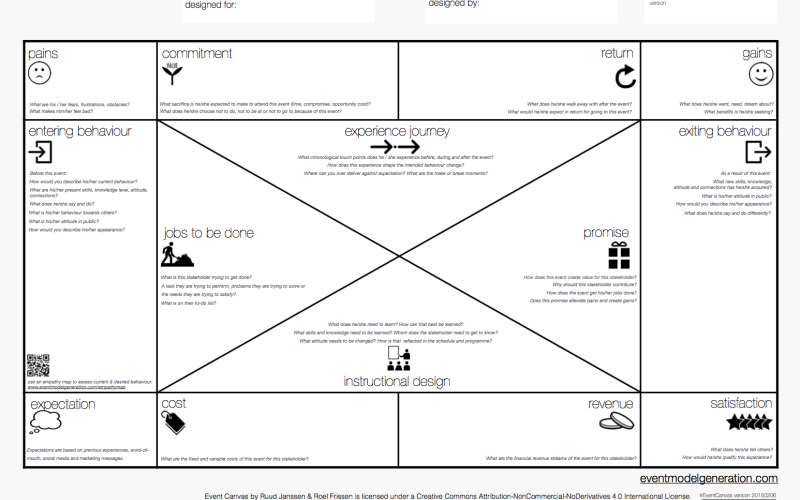
What is the #eventcanvas?
The #eventcanvas in words:
The #eventcanvas is a strategic management template for developing new or documenting existing events and conference models.
It’s a visual chart with elements describing an event’s promise, how it helps stakeholders to get their jobs done, resolving pains, and creating gains within a set framework of commitment and expected return. The canvas articulates how the behavior changes as a result of having participated in the event as well as stating the required levels of satisfaction against expectations. Additionally, the canvas outlines the costs and expected revenues in relation to the customer journey (service design) and the instructional design of the event.
The Canvas helps organizations align their activities by illustrating potential trade-offs of their events. Building a thorough #eventcanvas can be achieved through a 10 step #eventcanvas methodology where the team involved in the event systematically analyses, describes and outlines the inputs for the components in the final canvas prototypes. The methodology is sequential and makes use of a range of visual thinking techniques including Empathy Mapping (courtesy of xplane), Value Proposition Canvas (courtesy Osterwalder), event ROI methodology (courtesy Phillips ROI Methodology), the Business Model Canvas (courtesy of Osterwalder), Service Design Canvas (Stickdorn & Schneider) and Instructional Design Model (Dick & Carey).
The #eventcanvas was created by Ruud Janssen and Roel Frissen which builds on the visual framework initially proposed by Alexander Osterwalder’s Business Model Canvas based on the earlier work on Business Model Ontology. The #eventcanvas is available for free download under a Creative Commons 4.0 license at www.edco.global
What is the Event Canvas methodology?
The Event CanvasTM methodology is an effective tool for creating impactful events in a shorter amount of time. This approach helps teams to clearly define the purpose of their event and the stakeholders involved. By analyzing each stakeholder’s role in the Event CanvasTM and determining the desired behavior change, the Event Delta is created. The Event Delta, the design goal, is the basis for prototyping being the final step of the design process.
Who created the #eventcanvas and how can I use it?
The #EventCanvas was created by Ruud Janssen and Roel Frissen which builds on the visual framework initially proposed by Alexander Osterwalder’s Business Model Canvas. Please note that the use of the free Event Canvas is limited to personal, non-commercial use. For commercial use of the Event Canvas please contact us for licensing options or see the pricing options here.
Where can I download it?
You can download the #EventCanvas under the creative commons Attribution Non-Commercial No Derivatives 4.0 license for free. We only ask you to leave your name, e-mail, organization, and city you live in to keep track of the usage and to keep you informed about new developments. Subscribe here to receive your free copy of the #EventCanvas in English, and several other languages.
I have an Event to design, what are my options?
In a changing business landscape, event owners are faced with the need for change, and event teams are challenged on how to implement that change. The Event Design Collective uses a three-stage methodology to get a grip on how events create value and how to measure success through behavioral change. Find out how you can lead change in your organization.
By following a structured process, and not just skipping to the final step of producing an event based on the first rough sketch, you will produce more effective events; reduce risk in the results; find a structured method that can be applied at any time, looking forward and looking back, allowing you to create and analyze patterns in your history. You can design for change, and create a team that is user-centric, meaning they are sensitive to context, fluid, and responsive to change. We can help you. Click here for more information.
How can I become an Event Designer?
Completing in-person training with the Event Design Collective will give you the invaluable tools and methodology proficiency to raise your events to the next level. Additionally, you will be able to meet and collaborate with a powerful network of event designers from around the world. Whether you complete a training unit with your team or alone, the common visual language is a professional investment that is translatable into events worth attending in the future. The Event Design Certificate (EDC) program provides training on 3 levels.
Who are we?
Event Design Collective GmbH is an organization operating as a training and consulting company around the globe based in Switzerland with representations in 14 countries in Europe, the Americas & Asia. Launched by entrepreneurs Ruud Janssen and Roel Frissen in 2014, the #EventCanvas is a methodology and visual prototyping tool that can be used by planning professionals and event owners to improve their current and future events. Industry adoption of the methodology has grown exponentially becoming the gold standard Event Design methodology. This has sparked an expanding network of licensees, with a global community of practitioners with training & resources available in multiple languages.

